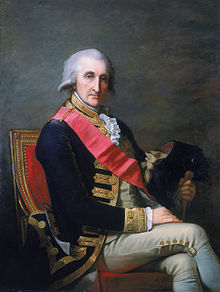George Rodney, 1st Baron Rodney

George Brydges Rodney, 1st Baron Rodney KB (born February 24, 1718 in Walton on Thames , Surrey , † May 23, 1792 in London ) was a British naval admiral .
Life
Rodney joined the Navy at the age of 14 and spent his first years on ships of the line , mostly in the Channel and the Mediterranean. At the age of 21 he became a lieutenant on the Dolphin and at the age of 24 captain of the Plymouth . During the Austrian War of Succession (1740–1747) he was escort south of Ireland. In the Second Sea Battle at Cape Finisterre he commanded the ship of the line Eagle under Admiral Hawke . He was then stationed in Newfoundland and finally Portsmouth . In 1751 he was elected to the House of Commons ; he held the seat until 1782.
In the Seven Years War (1756–1763) Rodney was involved under Admiral Boscawen in the capture of Louisbourg in Nova Scotia . In 1759 he was appointed rear admiral. In the same year he directed the bombardment of Le Havre and thus prevented a French invasion of the British Isles. In January 1762 he took part with a squadron of 17 ships of the line in the conquest of the island of Martinique in the West Indies and was then promoted to Vice Admiral. In 1764 he was raised to Baronet , of Alresford in the County of Southampton . In the following years of peace Rodney was first director of Greenwich Hospital , and then from 1771 to 1774 naval commander in Jamaica . Having got into financial distress due to gambling debts and failed political ambitions, he had to flee to Paris from his creditors. It was not until the outbreak of the American War of Independence that he was given command again.
Now promoted to Admiral, Rodney took command of the West India Squadron in 1778. On the way there he captured a Spanish convoy with his fleet of 22 ships of the line. In the subsequent naval battle off Cape St. Vincent he defeated the Spanish blockade squadron off Gibraltar on January 16, 1780 . After supplying Gibraltar with supplies, he arrived in the West Indies in March of the same year. On April 17, 1780, there was finally the sea battle off Martinique with a French squadron under Admiral de Guichen , which ended in a draw due to errors and misunderstandings. Further meetings on May 15 and 19 also remained inconclusive. On November 14, 1780 he was accepted as a Knight Companion in the Order of the Bath . On February 3, 1781, Admiral Rodney appeared with his squadron off the island of Sint Eustatius , which belongs to the Netherlands . He landed 3,000 men and asked Governor Johannes de Graeff to surrender within an hour. Since de Graeff had no significant armed forces, he gave Rodney the island without a fight. De Graeff - who, through the salute for Andrew Doria (De Graeff recognized the recently founded United States of America as a sovereign nation as the first representative of a sovereign nation ), had drawn the particular displeasure of the British government - was initially taken prisoner brought to London by his family . Rodney won a decisive victory against the French on April 12, 1782. In the battle of Les Saintes he defeated them under Comte de Grasse .
On his return to England, Rodney was showered with honors - but he was never given another command. On 19 June 1782, he was as Baron Rodney , of Rodney Stoke in the County of Somerset , to peer collected and became a member of the House of Lords . Rodney, who was considered a good tactician, had failed to pursue the French fleeing after the battle at Les Saints and to take the remaining ships as prizes . As a result, he came under criticism in particular from his then deputy Admiral Samuel Hood .
The British battleship HMS Rodney (launched in 1922) was named after George Brydges Rodney, as was its sister ship HMS Nelson after the famous Admiral Horatio Nelson .
literature
- Helmut Pemsel : World history of seafaring. Volume 6, Seeherrschaft II: Naval Wars and Maritime Politics from 1650 to 1914. Koehler, Hamburg 2005, ISBN 3-7822-0838-2
- Elmar B. Potter, Chester W. Nimitz and Jürgen Rohwer: Seemacht. A history of naval warfare from antiquity to the present . Bernard & Graefe Verlag, Munich 1982, ISBN 3-88199-082-8
Web links
| predecessor | Office | successor |
|---|---|---|
| Charles Watson |
Commodore Governor of the Colony of Newfoundland 1749 |
Francis William Drake |
|
James Douglas Hyde Parker Samuel Hood |
Commander-in-Chief, Leeward Islands Station 1762–1763 1780–1781 1782 |
Robert Swanton Samuel Hood Hugh Pigot |
| Arthur Forrest | Commander-in-Chief, Jamaica Station 1771–1774 |
Clark Gayton |
| New title created |
Baronet, of Alresford 1764-1792 |
George Rodney |
| New title created |
Baron Rodney 1782-1792 |
George Rodney |
| personal data | |
|---|---|
| SURNAME | Rodney, George, 1st Baron Rodney |
| ALTERNATIVE NAMES | Rodney, George; Rodney, George Brydges; Rodney, George Brydges, 1st Baron Rodney |
| BRIEF DESCRIPTION | British naval admiral |
| DATE OF BIRTH | February 24, 1718 |
| PLACE OF BIRTH | Walton on Thames , Surrey |
| DATE OF DEATH | May 23, 1792 |
| Place of death | London |